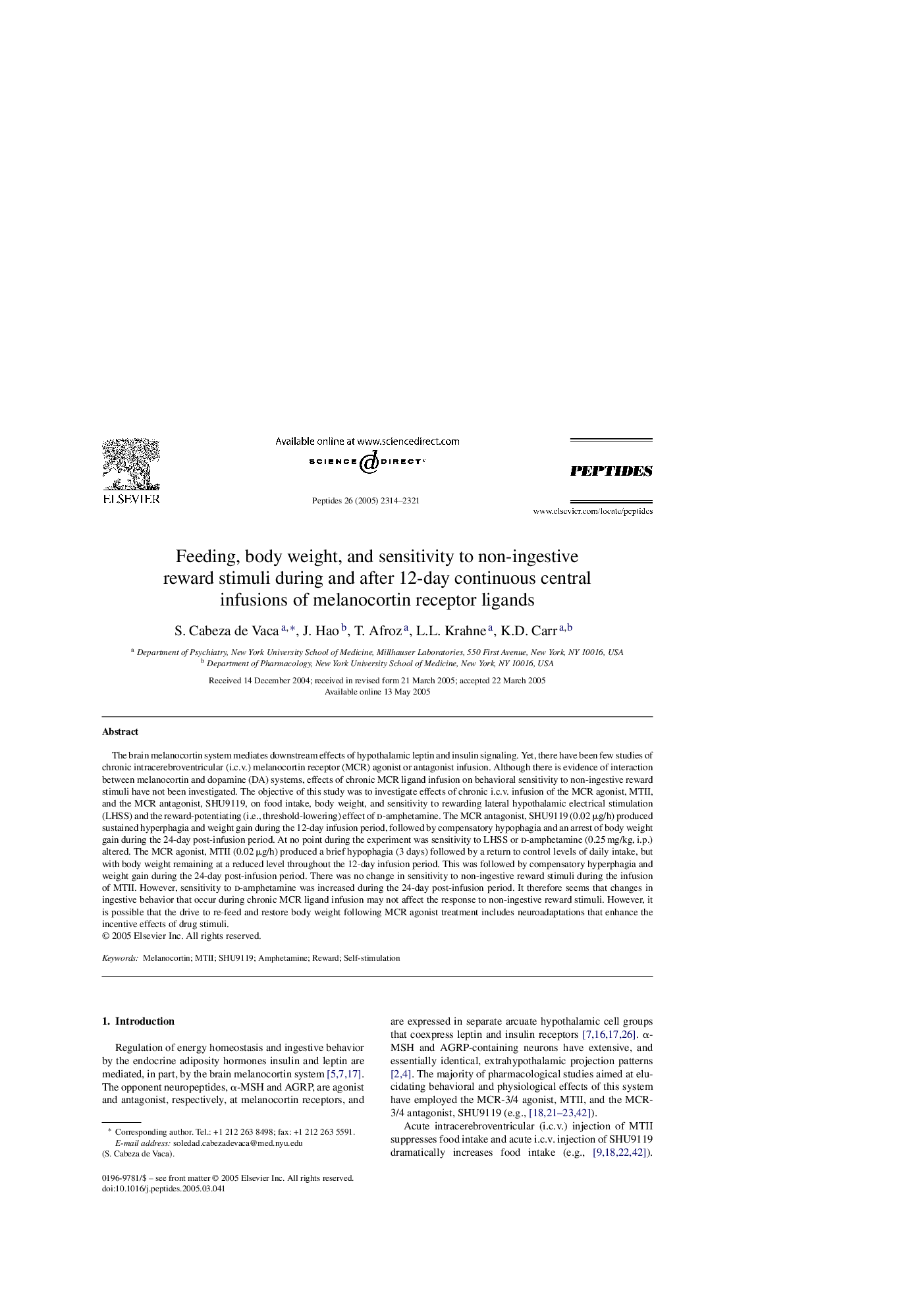| کد مقاله | کد نشریه | سال انتشار | مقاله انگلیسی | نسخه تمام متن |
|---|---|---|---|---|
| 2008796 | 1066444 | 2005 | 8 صفحه PDF | دانلود رایگان |
عنوان انگلیسی مقاله ISI
Feeding, body weight, and sensitivity to non-ingestive reward stimuli during and after 12-day continuous central infusions of melanocortin receptor ligands
دانلود مقاله + سفارش ترجمه
دانلود مقاله ISI انگلیسی
رایگان برای ایرانیان
کلمات کلیدی
موضوعات مرتبط
علوم زیستی و بیوفناوری
بیوشیمی، ژنتیک و زیست شناسی مولکولی
زیست شیمی
پیش نمایش صفحه اول مقاله

چکیده انگلیسی
The brain melanocortin system mediates downstream effects of hypothalamic leptin and insulin signaling. Yet, there have been few studies of chronic intracerebroventricular (i.c.v.) melanocortin receptor (MCR) agonist or antagonist infusion. Although there is evidence of interaction between melanocortin and dopamine (DA) systems, effects of chronic MCR ligand infusion on behavioral sensitivity to non-ingestive reward stimuli have not been investigated. The objective of this study was to investigate effects of chronic i.c.v. infusion of the MCR agonist, MTII, and the MCR antagonist, SHU9119, on food intake, body weight, and sensitivity to rewarding lateral hypothalamic electrical stimulation (LHSS) and the reward-potentiating (i.e., threshold-lowering) effect of d-amphetamine. The MCR antagonist, SHU9119 (0.02 μg/h) produced sustained hyperphagia and weight gain during the 12-day infusion period, followed by compensatory hypophagia and an arrest of body weight gain during the 24-day post-infusion period. At no point during the experiment was sensitivity to LHSS or d-amphetamine (0.25 mg/kg, i.p.) altered. The MCR agonist, MTII (0.02 μg/h) produced a brief hypophagia (3 days) followed by a return to control levels of daily intake, but with body weight remaining at a reduced level throughout the 12-day infusion period. This was followed by compensatory hyperphagia and weight gain during the 24-day post-infusion period. There was no change in sensitivity to non-ingestive reward stimuli during the infusion of MTII. However, sensitivity to d-amphetamine was increased during the 24-day post-infusion period. It therefore seems that changes in ingestive behavior that occur during chronic MCR ligand infusion may not affect the response to non-ingestive reward stimuli. However, it is possible that the drive to re-feed and restore body weight following MCR agonist treatment includes neuroadaptations that enhance the incentive effects of drug stimuli.
ناشر
Database: Elsevier - ScienceDirect (ساینس دایرکت)
Journal: Peptides - Volume 26, Issue 11, November 2005, Pages 2314-2321
Journal: Peptides - Volume 26, Issue 11, November 2005, Pages 2314-2321
نویسندگان
S. Cabeza de Vaca, J. Hao, T. Afroz, L.L. Krahne, K.D. Carr,